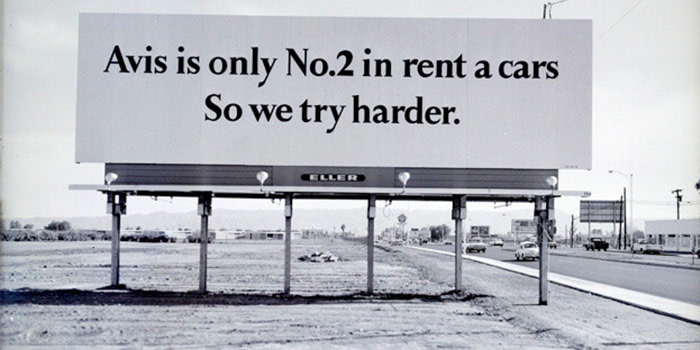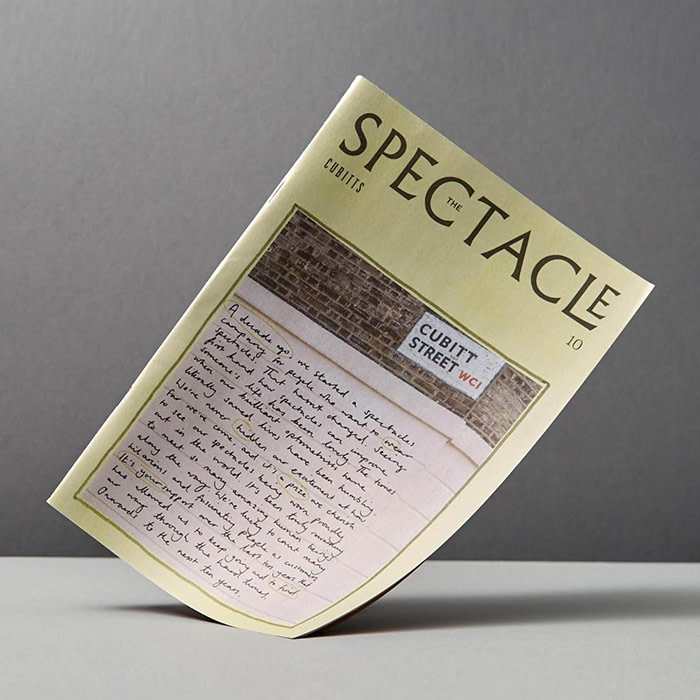Why corporate constipation is the biggest opportunity for challenger brands
Smaller companies can win by giving the one thing that large ones can’t.

Note from the author: I must apologise for the following deluge of cursing. There are 29 uses of the word sh*t in this article. That’s without doubt 29 more than the lovely, wholesome people at MOO would dream of using. So if you’re terribly offended, please direct your disappointment at me. Right then…
In the 1960s, car hire company Avis launched an ad campaign that became legendary – in advertising circles at least. “When you’re only number 2,” they declared from billboards across America, “you try harder.” It was a clever way to turn a weakness (not being the category leader) into a strength (our customer service is better). And it worked. Their market share quickly grew.

Now, while this was more a demonstration of cunning than it was of caring, it nevertheless became the poster child for a timeless truth: smaller companies can win by putting heart and sweat into the details that bigger companies won’t.
I see this a lot with startups and scale-ups. In 2018, I was helping spectacle maker Cubitts with some brand positioning work. I asked their founder, Tom Broughton, what makes Cubitts different/interesting. His reply:
“We care. Like genuinely give a sh*t. About every single little part of it.”
This wasn’t a hollow statement. Cubitts really do give a sh*t. This is why they screw the hinges into their frames by hand instead of getting a machine to glue them. It’s why they run workshops to help people make their own glasses and even print their own wonderfully nerdy newspaper, The Spectacle. They even made a chess set once and Tom himself – an industrial designer – made the first one personally.
But perhaps the sh*t-giving example that sticks in my mind the most is this: During my research, I ran a focus group with some of Cubitt’s customers and their head of customer experience curated the whole thing as though she were expecting royalty; every chair spaced perfectly, each person receiving their own goodie bag. As the attendees filed into the room, I watched them beam importantly as every expectation they had of the brand was lived up to – and then some.

“Sh*ts given are sh*ts perceived.”
That’s the great thing about giving a sh*t. Sh*ts given are sh*ts perceived. I.e. customers notice them. And in small companies that have strong cultures and a set of shared beliefs, sh*t-giving becomes practically contagious. It flows from the founder to leadership to everyone else and eventually out to customers. The stronger your sh*t-giving culture is, the less that sh*t-giving dissipates on its journey from founder to customer.
In my own list of clients alone, I can think of several more examples of strong sh*t-giving cultures. The respective founders of Kriya and Sano Genetics both started their own podcasts out of personal enthusiasm for their sectors. Finisterre hold themselves to the highest standards on sustainable manufacturing. Farewill puts the work in to make sure every person who needs to write a will or plan a funeral gets the time and space to do it in a way that’s right for them. And the team at Dishpatch put more care into packaging up food than any other finish-at-home meal kit on the market.

Any one of those decisions would be shot down by a cynic, drunk on optimisation and looking purely at short-term performance. But you and I know that this kind of inherent sh*t-giving is the special sauce that those who do it don’t need to rationalise and those that don’t will never understand. You couldn’t attribute a single sale to the giving of these sh*ts, but you can feel their accumulating value over time. A sh*t-shower if you will.
Of course, as we all know, when most companies get to a certain scale, the giving of sh*ts tends to wane. Eventually there are so many layers between the founder who originally gave a sh*t to the people dealing with customers that there are pretty much no sh*ts being given at all. There’s too much abstraction and politics; staff too detached and disinterested in the vision of the company. Too many processes geared towards efficiency. And before you know it there isn’t a sh*t in sight. This, you might say, is corporate constipation.
True sh*t-givers aren’t worried about any of that of course, because they know what matters to them. They might even want to stay small to avoid watching those sh*ts fade away. But it does strike me that with the rapid acceleration of AI, small companies are more vulnerable than ever to losing this edge. Their sh*t-giving is at risk. This isn’t an anti-AI post. I’m not a cynic or laggard. I use quite a lot of AI in my own workflow. But there is a growing temptation for small companies to use AI to shortcut everything they do.
The brilliant thing about generative AI and productivity tools like otter.ai is that they enable small companies to do more, faster. The leveling aspect of this is exciting. But if misused, these tools are going to take away a lot more than a small monthly subscription fee. Yes, dear reader, if you’re not careful they may begin to take away your sh*ts.

Or, at least, that’s the danger. The more positive way to think about it is that technology tends to magnify human potential and intent. If you are someone that doesn’t give much of a sh*t then using AI is going to magnify that. And your customers will quickly feel it. But if you are a genuine, passionate, obsessive sh*t-giver (congratulations btw) then perhaps AI will multiply your sh*t-giving, enabling you to give more of them to more people in more ways.
Although I’ve gone on a slightly unhinged, cursing tangent, the reason any of this popped into my head was very much to do with MOO, who kindly asked me to write another article for them. MOO have been unwavering sh*t-givers ever since they arrived on the scene. Their founder, Richard Moross is still there, and from where I’m standing, his sh*ts haven’t waned at all. You see it in MOO’s culture and all their products too. Every MOO product is dripping with care and quality. And it’s through simple things like high quality and good design that any small company can signal the authenticity of their sh*t-giving. Caring enough to do things better is not something that can be faked.
“We are what we make, what we do, what we buy and what we give.”
Because of all this, MOO attracts customers that also give a sh*t. And just as this attitude passes from MOO’s founder to MOO’s employees, it eventually passes into the lives of their customers’ customers too. The care that goes into things (products, communication, relationships) is a form of social currency. We are what we make, what we do, what we buy and what we give. So next time you feel like giving something, well, I think you know what it should be.
Andy Whitlock is founder of strategic brand consultancy, The Human Half.
Keep in touch
Get design inspiration, business tips and special offers straight to your inbox with our MOOsletter, out every two weeks.



